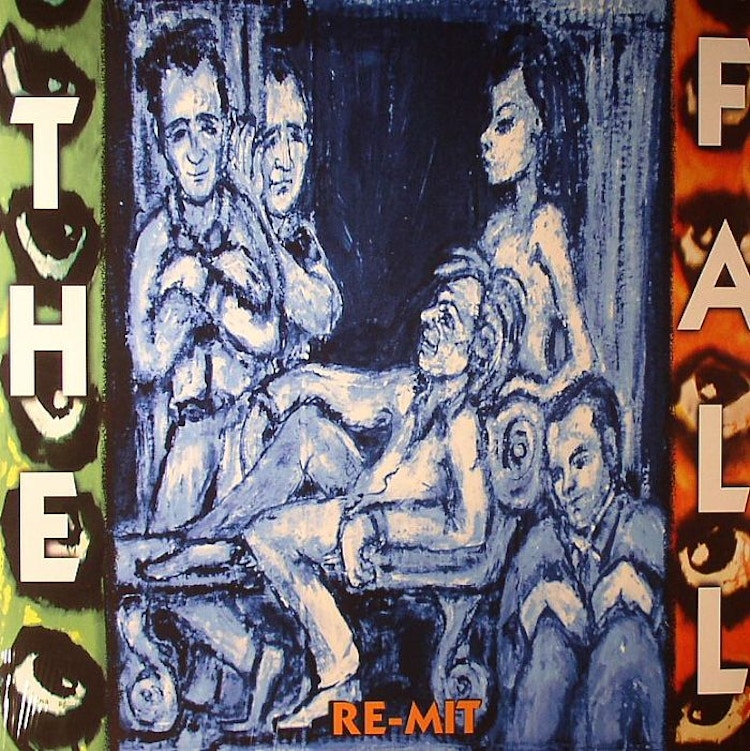"Re-Mit"

“Re-Mit is going to absolutely terrify people. It’s quite horrible. The Fall have had enough and we’re coming for you,” announced Mark E. Smith in a recent interview. It was inevitable, of course, that this would provoke the assumption that Re-Mit was going to be a formidable continuation of the widely deplored Ersatz GB. But as the guitar lines of instrumental opener ‘No Respects’ descend into a primitively pummelling groove – it almost sounds like a blithe paradox to the malevolent, disorderly brawl of Ersatz.
In fact, ‘No Respects’ is The Fall reverting back to a time when they were at their most accessible. You almost expect Brix Smith’s customary yelp to interject the garage-rock stomp that forms its essentially playful core. And just when you thought Smith was being facetious with his emphatic claims, the record promptly abandons its façade and transcends into the chaotic sprawl of ‘Sir William Wray’ with its dominant synth, intertwining guitars and boisterous vocal squall’s. For a second there we thought we’d been duped by post-punk’s undisputed ruler and sole constant, but it was a short-lived sensation.
The Fall’s trajectory has never remained unchanged – but Mark E. Smith’s unyielding pursuit to be anything other than predictable is perpetually present. There’s nothing habitual about any Fall album – except the force of Smith’s famous declamatory bark – his prominent but often detached utterance – infinitely cryptic but sounding more apathetic over time; gradually losing coherency over the course of their discography. Although that doesn’t imply any signs of complacency, because it’s Mark E. Smith’s contrary instinct that has turned The Fall into one of the most prolific, consistently compelling cult acts in British music.
Of course, The Fall do have a ‘Trademark’, and it’s their ability to undergo a myriad of stylistic changes over the years without eschewing that archetypal “Fall sound” – defined by abrasive guitar and frequent use of repetition, continuously underpinned by Smith’s idiosyncratic vocals and esoteric lyricism. And that’s perhaps why Ersatz GB wasn’t particularly triumphant to the majority of critics and fans alike, because the prominence of Smith’s lyrics is distinctly amiss, lost under the cacophony of brutish instrumentation and Smith’s incomprehensible snarl.
It’s almost surprising just how much more lyrically focused this record is in contrast to its precedent. This is particularly distinct in ‘Jetplane’ in which Elena’s predominant keyboard sound is coupled with an infectious military march rhythm, sustained by Mark’s cantankerous rant about airline queues. Despite the mundane subject matter Smith shows his inherent deftness for depicting banality using shrewd poetic discourse, meanwhile Elena’s keyboard proficiency is evocative of a certain Fall sound that hasn’t quite been interpreted this well since the late ‘80s. Elsewhere Mark E Smith is a ferocious presence. ‘Hittie Man’ recalls early ’80s Fall with its post-punk growl and ominous bass, while tracks like ‘Victricola Time’ and ‘Noise’ feel much like redundant fillers that could easily be forgotten.
And that’s why Re-Mit affirms the general perception of recent Fall albums being primarily one on, one off. While Ersatz initially sounds not quite as involved or developed, Re-Mit seems more focused with a vision – it’s what you would expect The Fall to sound like in 2013, 30 albums down the line (having pretty much released one a year since their inaugural studio effort Live At The Witch Trials in 1979). It is fully charged – it’s hard as nails – yet none of this record seems to be in the same brutal vein as Ersatz GB. And while it achieves clearer production and a style that is livelier and more melodically centred, it doesn’t sacrifice its uncompromising and challenging nature. Instead it revisits elements of The Fall’s past while continuing to be innovative.
Re-Mit isn’t exactly going to win over the uninitiated, but for abiding fans this is an album that – while it doesn’t reside amongst the best of their work – certainly deserves to be credited as one of their most ambitious, envelope-pushing albums of the band’s discography. Never have The Fall sounded so brilliantly abstruse or downright weird – maybe at least not since Levitate. It’s an unsettling, incomparable racket of The Fall at their wonderful, frightening best.
Get the Best Fit take on the week in music direct to your inbox every Friday

Great Grandpa
Patience, Moonbeam

Deafheaven
Lonely People With Power

Perfume Genius
Glory





